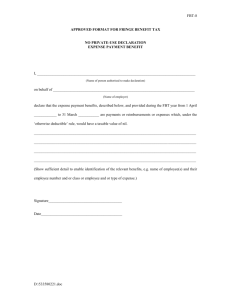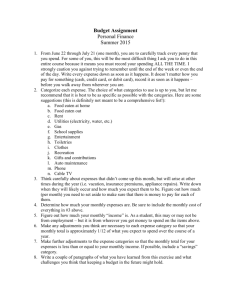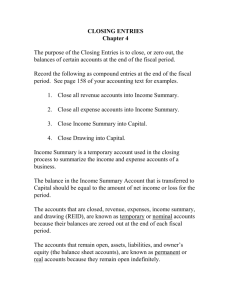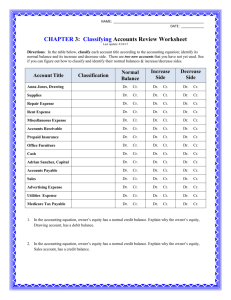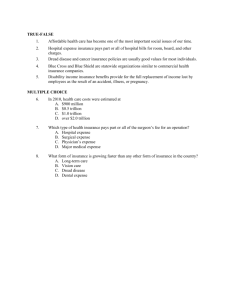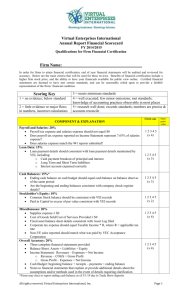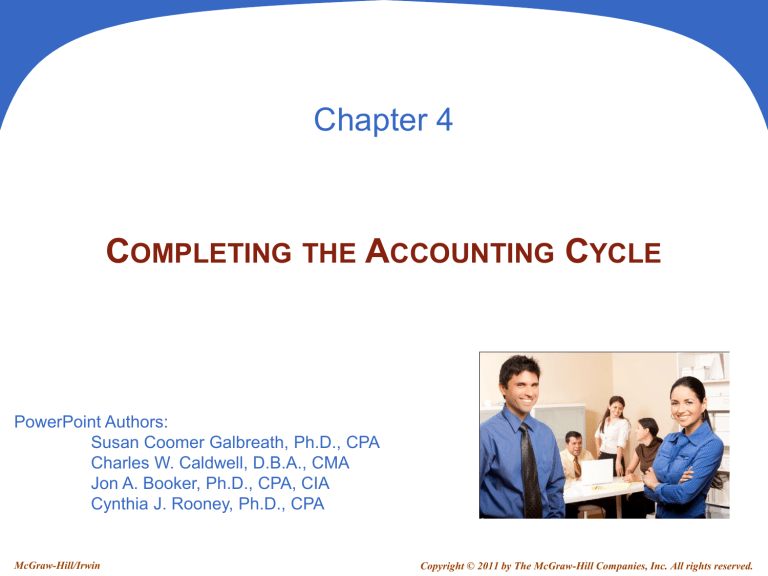
Chapter 4
COMPLETING THE ACCOUNTING CYCLE
PowerPoint Authors:
Susan Coomer Galbreath, Ph.D., CPA
Charles W. Caldwell, D.B.A., CMA
Jon A. Booker, Ph.D., CPA, CIA
Cynthia J. Rooney, Ph.D., CPA
McGraw-Hill/Irwin
Copyright © 2011 by The McGraw-Hill Companies, Inc. All rights reserved.
4-2
P1
BENEFITS OF A WORK SHEET
Aids the
preparation of
financial
statements.
Reduces
possibility of
errors.
Links accounts
and their
adjustments.
Assists in
planning and
organizing an
audit.
Not a
required
report.
Helps in
preparing
interim financial
statements.
Shows the
effects of
proposed
transactions.
P1
FastForward
Worksheet
For the Month Ended December 31, 2011
4-3
4-4
P1
PREPARING THE FINANCIAL STATEMENTS
4-5
P1
PREPARING THE FINANCIAL STATEMENTS
4-6
C1
RECORDING CLOSING ENTRIES
1. Resets revenue,
expense and
withdrawal account
balances to zero at
the end of the
period.
2. Helps summarize a
period’s revenues
and expenses in the
Income Summary
account.
Identify accounts
for closing.
Record and post
closing entries.
Prepare post-closing
trial balance.
4-7
TEMPORARY AND
PERMANENT ACCOUNTS
C1
Income
Summary
Liabilities
Permanent
Accounts
The closing process
applies only to
temporary accounts.
Owner’s
Capital
Temporary
Accounts
Assets
Withdrawals
Expenses
Revenues
4-8
P2
RECORDING CLOSING ENTRIES
Close Credit Balances in
Revenue Accounts to
Income Summary.
Close Debit Balances in
Expense accounts to Income
Summary.
Close Income Summary
account to Owner’s Capital.
Close Withdrawals to
Owner’s Capital.
Let’s see how
the closing
process works!
4-9
P2
FastForward
Adjusted Trial Balance
December 31, 2011
Debit
Cash
$
4,350
Accounts receivable
1,800
Supplies
8,670
Prepaid insurance
2,300
Equipment
26,000
Accumulated depreciation-Equip.
Accounts payable
Salaries payable
Unearned consulting revenue
C. Taylor, Capital
C. Taylor, Withdrawals
200
Consulting revenue
Rental revenue
Depreciation expense-Equipment
375
Salaries expense
1,610
Insurance expense
100
Rent expense
1,000
Supplies expense
1,050
Utilities expense
230
Totals
$ 47,685
Credit
$
375
6,200
210
2,750
30,000
7,850
300
$
47,685
Close Credit
Balances in
Revenue
Accounts to
Income
Summary.
4 - 10
P2
CLOSE CREDIT BALANCES IN
REVENUE ACCOUNTS TO INCOME SUMMARY
Dr.
Dec. 31
Consulting revenue
Rental revenue
Income summary
Cr.
7,850
300
8,150
Now, let’s look at the ledger accounts after
posting this closing entry.
4 - 11
P2
CLOSE CREDIT BALANCES IN
REVENUE ACCOUNTS TO INCOME SUMMARY
Consulting Revenue
7,850
7,850
Income Summary
8,150
Rental Revenue
300
300
-
4 - 12
P2
FastForward
Adjusted Trial Balance
December 31, 2011
Debit
Cash
$
4,350
Accounts receivable
1,800
Supplies
8,670
Prepaid insurance
2,300
Equipment
26,000
Accumulated depreciation-Equip.
Accounts payable
Salaries payable
Unearned consulting revenue
C. Taylor, Capital
C. Taylor, Withdrawals
200
Consulting revenue
Rental revenue
Depreciation expense-Equipment
375
Salaries expense
1,610
Insurance expense
100
Rent expense
1,000
Supplies expense
1,050
Utilities expense
230
Totals
$ 47,685
Credit
$
375
6,200
210
2,750
30,000
7,850
300
$
47,685
Close Debit
Balances in
Expense Accounts
to Income
Summary.
4 - 13
P2
CLOSE DEBIT BALANCES IN EXPENSE
ACCOUNTS TO INCOME SUMMARY
Dec. 31 Income summary
Depreciation expense-Equipment
Salaries expense
Insurance expense
Rent expense
Supplies expense
Utilities expense
Dr.
4,365
Now, let’s look at the ledger accounts
after posting this closing entry.
Cr.
375
1,610
100
1,000
1,050
230
4 - 14
P2
CLOSE DEBIT BALANCES IN EXPENSE
A
CCOUNTS TO INCOME SUMMARY
Depreciation
Expense- Eq.
375
375
-
Rent Expense
1,000
1,000
-
Salaries Expense
1,610
1,610
-
Supplies Expense
1,050
1,050
-
Insurance Expense
100
100
-
Utilities Expense
230
230
-
Income Summary
4,365
8,150
3,785
Net Income
4 - 15
SUMMARY OF THE CLOSING PROCESS
1. Close Credit Balances in Revenue Accounts
to Income Summary.
2. Close Debit Balances in Expense Accounts
to Income Summary.
3. Close Income Summary to Owner’s Capital.
4. Close Withdrawals Account to Owner’s
Capital.
4 - 16
END OF CHAPTER 4

